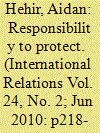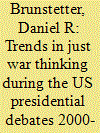| Srl | Item |
| 1 |
ID:
146918


|
|
|
|
|
| Summary/Abstract |
As empathetic as distant nations may feel about an ongoing or looming catastrophe in a particular region of Africa, they are too far removed from the horror to grasp its gravity and impact. Geographical proximity to the atrocity, and the likelihood of its spreading to their neighbourhoods, make the communities and neighbouring countries in the imploding region the best and most effective first responders to a crisis in their own backyard. A response from ‘communal’ or ‘regional’ groups is, therefore, the most practical measure for preventing human rights violations in Africa from descending into an actual genocide or an intractable genocidal condition. A community approach to preventing genocide and other human rights abuses should serve as the foundation for a new concept of ‘moral pan-Africanism’ on the African continent in the 21st century. This article makes an argument for this genocide prevention model and new moral concept.
|
|
|
|
|
|
|
|
|
|
|
|
|
|
|
|
| 2 |
ID:
097808


|
|
|
|
|
| Publication |
2010.
|
| Summary/Abstract |
The term 'Responsibility to Protect' (R2P) has dominated debate on humanitarian intervention since the publication in 2001 of the report of the International Commission on Intervention and State Sovereignty (ICISS). Today 'R2P' has become a seemingly obligatory reference point for all researchers in this field and R2P's near ubiquity is testament to the effective marketing of the idea. This article will argue, however, that the currency of the term obscures its hollowness. R2P has undeniably changed the discourse surrounding humanitarian intervention, and possibly broadened interest in the subject, but it has contributed little of substance or prescriptive merit. Though the report was drafted with the mandate to reconcile international human rights with state sovereignty it fudged the key issues, namely, substantive reform of the United Nations Security Council, the legitimacy of unilateral humanitarian intervention and the threshold for intervention. The shift in focus from response to prevention since 2001 evades the key issue which prompted the ICISS to draft its report and fails to provide a viable or innovative approach.
|
|
|
|
|
|
|
|
|
|
|
|
|
|
|
|
| 3 |
ID:
131698


|
|
|
|
|
| Publication |
2014.
|
| Summary/Abstract |
In this article, I explore the place of the just war tradition in US foreign policy by examining the use of just war language in the presidential debates in 2000 (Bush-Gore), 2004 (Bush-Kerry), 2008 (McCain-Obama), and 2012 (Obama-Romney). While critics focus on the use and abuse of just war language as rhetorical gloss to persuade the public an upcoming conflict is morally legitimate while serving the national interest, the debates showcase just war principles as part of a language of critical engagement. Each debate cycle allowed for critical reflection on the foreign policy decisions and just war philosophy of the incumbent president. During the time period I examine, the process of critical engagement identified two moral shortcomings of the past - the failure to act to stop the genocide in Rwanda and the premature use of force in Iraq. These perceived failures catalysed convergence, across party lines, on the way some jus ad bellum principles were understood: Just cause as including the moral obligation to intervene in some way to stop genocide and the renewed salience of the principle of last resort. There remained, however, stark differences in the way legitimate authority was understood.
|
|
|
|
|
|
|
|
|
|
|
|
|
|
|
|